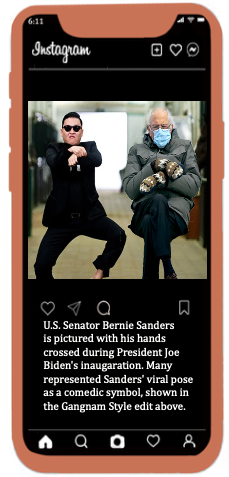Political memes emerge as potent messages

Graphic illustrations by Surya Saraf
Looking at the history of memes and how in recent times memes have been used as a way for politicians to promote their ideas. Memes have also become a platform to spread news.
December 12, 2022
During the 2020 vice presidential debate, a fly landed on former Vice President Mike Pence’s head, causing the buzz of the debate to continue on the internet for weeks after it ended. Twitter users quickly made the scene into a meme, joking about how the fly was a way for Donald Trump, the presidential candidate, to tell Pence what to say.
On Feb. 23, Ukraine’s official account posted a political cartoon after the first explosions were heard in Russia’s invasion of Ukraine. The tweet, and many others, have since gone viral, gaining 1.7 million likes.
“Our generation deals with everything in a very satirical manner,” senior Esther Shih said. “When I log onto Twitter, I see memes about the most recent event. I get my news from what’s trending and different hashtags.”
The term “meme” was first coined to describe a type of genetic disease. Memes have evolved to become a significant aspect of the internet that encompasses a variety of jokes, from captioned images to pranks. Yet memes in the past few years have evolved into something much more politicized and targeted.
Many people receive their news through memes, with their online interactions reflecting the increasingly polarized views on political events. Political marketers and campaign organizers often take advantage of such meme culture, as going viral is a quick way to attract young audiences and elicit negative emotions toward other candidates.
In 2012, former president Donald Trump tweeted, “Let’s take a closer look at that birth certificate,” as an attack on former president Barack Obama, implying Obama was not born in the U.S. These attacks were rewarded with viral social media interaction, and the tweets were made into memes in a matter of minutes, giving Trump more publicity with audiences who otherwise would not have seen his tweets.
“Deeply troubling things usually build on themselves and become viral, creating addictive content,” said Carmen Acevedo Butcher, adjunct professor and lecturer of “The Meme and the Human: Digital Literacies” course in College Writing Programs at UC Berkeley. “I’m also very, very worried about that.”
In a largely information-heavy society, pop and political culture is dominated by the use of memes to share information. According to YPulse, 50% of 13-35 year olds send memes at least once every week and 30% once every day. This constant intake of information has heavy psychological impacts on users. A study done by Frontiers Psychology illustrates that reliance on sourcing information from social media can cause users to experience warped views on the perception behind political events. It’s been linked to signs of fatigue among teenagers and increased distrust for other traditional news sources.
“It’s essentially psychological operant conditioning,” Butcher said. “Even if you know social media is harmful, it gives you pleasure and users always find themselves going back.”
After interacting with specific memes, the algorithm behind social media sites will then push that user to engage with like-minded peers. This selective exposure to similar content widens political fragmentation. It’s also a key segue for politicians to target specific audiences through the collection of user data, such as how Cambridge Analytica, a political consulting company, harvested the data of up to 87 million people, impacting the 2016 elections.
Meme culture continues to rise given the boom in popularity of new features such as Tiktok, Instagram Reels and “video memes,” appealing to younger audiences. Politicians and companies are beginning to monetize content like memes in order to promote their messages or products.




























































